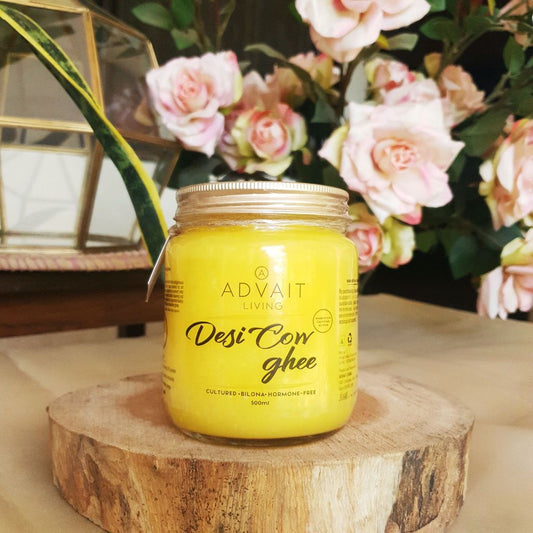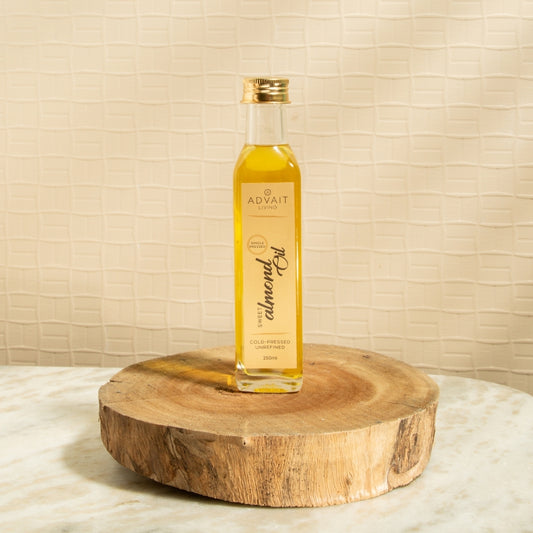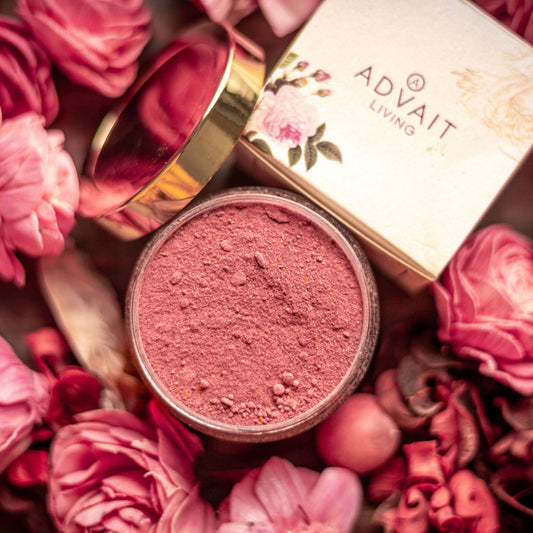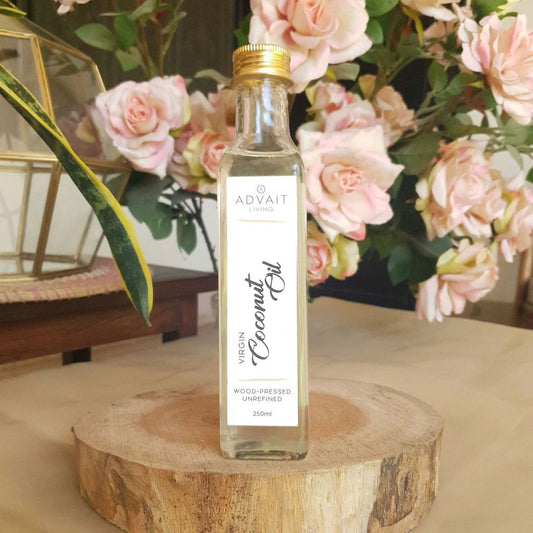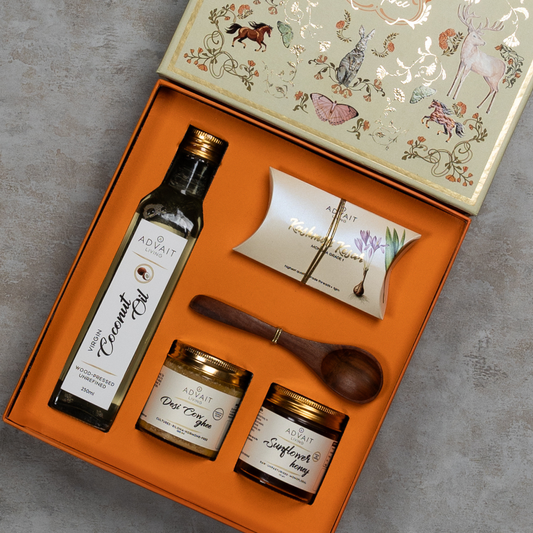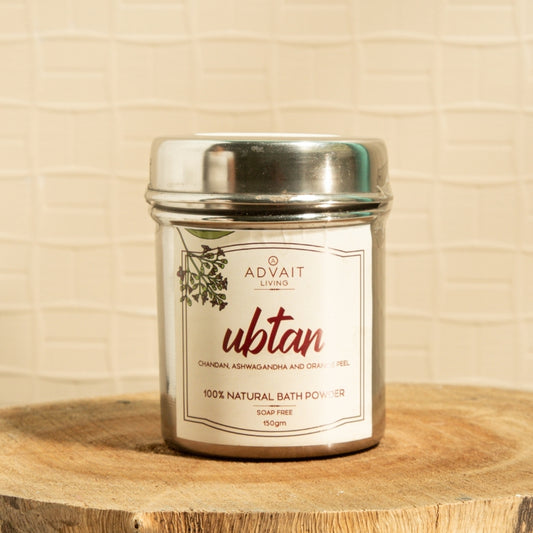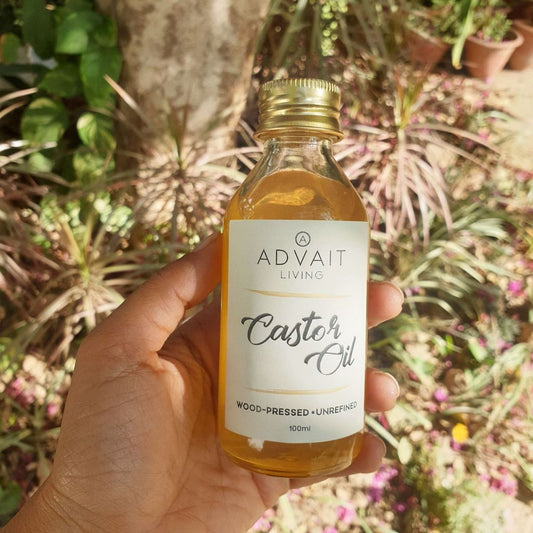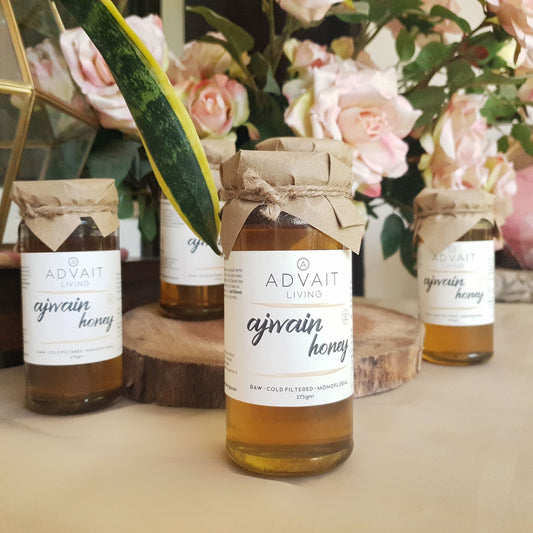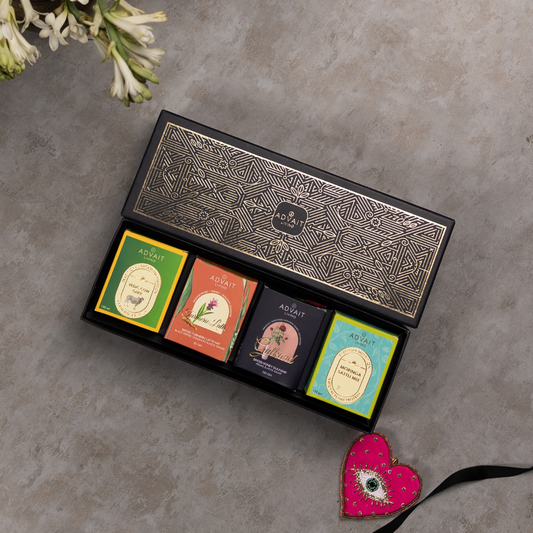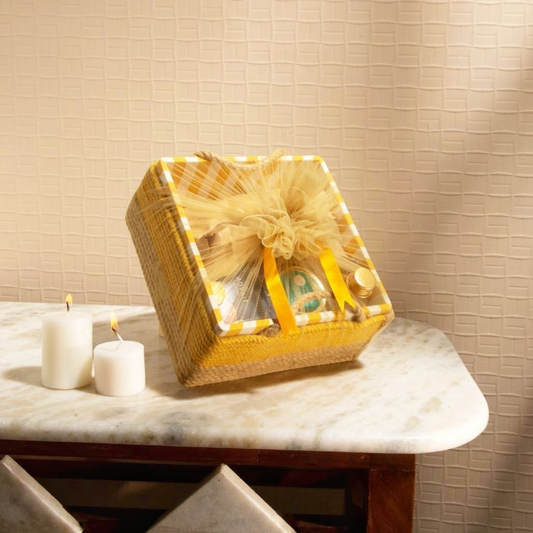Just as health and wellness begin at home, skincare also starts at home. It starts in the kitchen with your Ghee (ask your grandmother if you don't believe us!).
Desi ghee has been revered in Ayurveda for centuries and is considered a "rasāyana"- that invigorates the body. Ghee is also referred to as ‘Ojovardhak’, meaning it improves the vitality and energy of the body owing to its radiance-boosting, anti-oxidant properties. This healthy fat is the base for many home remedies that will hydrate your skin and restore its natural glow!
What is Ghee?
Known as liquid gold, ghee is made by separating milk solids from butter using heat. It is a clear liquid that provides the richness of butter without refrigeration. Expert studies claim that cow ghee is considered nectar in Ayurveda and benefits the entire body.
Chemically, ghee is a complex lipid of mixed glycerides with small amounts of free fatty acids, phospholipids, sterols and their esters, carotenoids, hydrocarbons, charred casein, traces of copper and iron, moisture, along with fat-soluble vitamins A, D, E and K. The presence of short-chain fatty acids, fat-soluble vitamins and essential fatty acids like linolenic acid and arachidonic acid in ghee makes it superior to other fats.
Apart from the health benefits, Ghee is extremely beneficial for the skin and safe for skincare application as well.
Benefits of Using Desi Ghee on Skin
This anhydrous fat adorning your rotis and parathas can make your skin glow too, which is one of the many benefits of ghee. Its antioxidant-rich properties reduce pigmentation as well. Ghee works from both within the body and topically to help achieve a young, radiant, glowing skin and helps you
- Get luminous and radiant skin
- Get younger and smoother skin
- Manage dark spots
- Soothes allergy-prone skin
- Reduce wrinkles
- Moisturize skin
- Remove tan
- Manage eczema, acne, and psoriasis
- Reduces skin rashes and inflammation
I. Ghee Hydrates the Skin from Inside
Desi ghee is a natural moisturiser and emollient that penetrates deep into the skin and provides long-lasting hydration. Rich in natural fatty acids, ghee provides a barrier and creates a protective layer over your skin that traps moisture, protecting it from allergens and irritants. It also fills the gaps between the cells in the skin, making it appear smoother and softer.
Vitamin E, in ghee, is a hydrating nutrient that behaves both as a humectant (to absorb water into the skin) and an emollient (to trap water in the skin). It helps to keep the skin hydrated. Another skin-friendly nutrient in desi ghee is palmitic fatty acid. This works as an emollient as well. When applied to skin, palmitic acid helps retain moisture and slows the loss of water through the skin.
II. Ghee Protects the Skin from Ageing
Too much exposure to ultraviolet rays (UV rays) can have unintended consequences, especially for the skin. Chronic exposure to UV rays can be particularly harmful to the skin and may cause sunburn and premature ageing of the skin with the appearance of wrinkles, patchy skin, redness or even disorders such as actinic keratosis and solar elastosis. In actinic keratosis, a rough patch of skin may appear around the face, lips, neck or back of the hands that may keep growing. Solar elastosis is a condition in which the skin appears yellow and thickened as a result of abnormal elastic tissue accumulation due to long exposure to the sun.
Ghee has two major anti-ageing nutrients, both of which work in several ways to protect your skin, especially when you consume it as part of your diet as opposed to topical applications:
- Beta carotene
- Vitamin E
1. Beta-carotene:
A diet rich in beta-carotene is highly useful to protect yourself from the harmful effects of UV rays, and A2 cow ghee is packed with beta-carotene. The yellow colour in desi cow ghee is indicative of the presence of beta-carotene, which comes from the cow's diet.
Carotenoids (including beta-carotene) tend to accumulate in the skin, mostly in the epidermis, the protective outer layer of the skin. As such, carotenoids become a protective barrier to various environmental influences, including UV rays, air pollution and smoking. Hence, they are the first line of defence against skin ageing.
UV rays are perhaps the foremost environmental factor that causes detrimental sun effects, leading to ageing. Beta-carotene is also called a sun-protectant, and strong evidence shows that beta-carotene produces a protective effect against UV-induced erythema (reddening of the skin).
2. Vitamin E:
Numerous studies show that Vitamin E displays similar photo-protective properties against UV rays as beta-carotene and also protect the skin from UVR.
In addition, Vitamin E is hailed for its antioxidant properties. Vitamin E protects the body by scavenging free radicals. Free radicals are independent and unstable molecules in the body that tend to damage other cells through a process known as oxidation. Over time, free radicals break down our skin's collagen, increase skin blemishes such as wrinkles, dark spots, fine lines and lead to loose and saggy skin.
Vitamin E is one of the major lipid-soluble antioxidants in desi ghee, which protects the epidermis and dermis of the skin against oxidative stress induced by environmental factors.
Hence, consuming A2 cow ghee can be a great way to increase β-carotene and vitamin E in your body to aid skin health.
III. Ghee Promotes Youthful and Firm Skin
If you want firm, youthful, and plump skin, you cannot do it without adequate amounts of collagen or elastin in your skin. Collagen and elastin are both structural proteins found in the body that keep the skin elastic and prevent it from sagging. They build our skin from within, giving us that plump and youthful look. However, as you age, you start to lose both in your skin.
Here's how eating or applying A2 Cow Ghee can strengthen the production of collagen and elastin within the body:
Vitamin A:
Vitamin A (retinol) is considered the 'gold standard' when it comes to youthful skin, improved texture, radiance and even collagen synthesis. Good quality cow ghee is a rich source of Vitamin A and even retinol. Several studies show that retinoids strengthen the protective function of the epidermis, protect collagen against degradation and regulate new cell production and even cell apoptosis (cell death). One of the unique aspects of cow ghee is also the additional presence of beta-carotene, which is also easily converted by the human body to Vitamin A (retinol).
Vitamin A is also crucial to promote the production of keratinocytes, which are primary skin cells. In fact, keratinocytes constitute 90% of all epidermal skin cells. When applied topically, the Vitamin A in ghee can easily be absorbed by the skin and help increase new cell production, neutralise free radicals and even stimulate new blood vessel production.
Vitamin K:
Ghee is one of the richest food sources of vitamin K2, and recent studies demonstrate that Vitamin K2 boosts collagen production in the body. Levels of Vitamin K are also directly linked to elastin degradation or loss of skin elasticity, which causes the skin to look saggy, crinkled, or leathery. Elastin is a protein that stretches, recoils and provides elasticity to our skin. Vitamin K2 is essential to activate matrix-GLA protein, which in turn prevents calcification of elastin and elastin degradation. Hence, Vitamin K2 is essential for maintaining youthful skin.
Fun fact - Collagen is the main component of the skin – in fact, 80 per cent of our skin is formed from collagen.
IV. Ghee Helps with Skin Brightening
Ghee is rich in fat-soluble vitamins A, D, E and fatty acids with antioxidant properties, resulting in skin nourishment and neutralisation of free radicals. Ghee helps in moisturising the skin, which imparts shine and glow to the skin; hence, application of ghee can brighten dull skin.
When we talk about skin brightening, it actually means several different mechanisms that come together to make our skin seem brighter, glow and look healthy.
1. Vitamin A & E helps with depigmentation:
Melanin is a colour pigment that is responsible for making our skin, hair, and eyes appear darker. Hyperpigmentation occurs when melanocytes, or melanin-producing skin cells, overproduce to protect the skin from UV damage or inflammation. This makes our skin appear darker or render uneven skin tones with dark spots.
Vitamin A is particularly helpful as it normalises the activity of tyrosinase (an enzyme) that directly regulates the production of melanin in skin cells. Vitamin E, with its powerful anti-oxidant properties, combats multiple harmful impacts of free radicals and oxidative stress, making the skin appear more even-toned and radiant. Both Vitamin A & E also help in reducing blemishes, dark spots and even a tan!
2. Protection from harmful UV radiation:
Vital nutrients in ghee, such as Vitamin A, E & even beta-carotene, behave as sun-protectants and help reduce skin reddening and damage to the skin, making it look more radiant. While beta-carotene provides a protective barrier, Vitamin E can absorb energy from UV light, thus providing photo-protection from UV damage. Even retinyl esters, a storage form of vitamin A, absorb ultraviolet radiation, providing UV protection.
3. Produces new and younger skin cells:
Dull skin is usually a result of dead skin and grime on the skin. Ghee can easily help shed dead skin by replacing existing cells with new and younger cells. While the essential fatty acids and vitamins in desi ghee work their magic of boosting cell turnover from within, topical application of ghee, as an exfoliator, is highly useful to remove grime and dust on the skin and make it bright and luminous.
V. Ghee Reduces Skin Inflammation
Skin inflammation can occur as a rash, redness of the skin or even breakouts like blisters. Inflamed skin can be painful, itchy, and dry and may lead to chronic illnesses. Skin inflammation may be caused due to certain infections or be an immune response in the body. Healthier skin is less inflamed, often, and ghee can be a good medium to combat inflammation in the body. Consuming ghee, with its rich source of fat-soluble nutrients such as Vitamin D, A, E & K, can help reduce skin inflammation and boost overall skin health.
Several studies provide strong evidence that Vitamin D deficiency is directly linked to inflammation in the body. Consuming ghee can improve vitamin D levels in the body. Vitamin D contains anti-inflammatory properties that help treat skin conditions like eczema, dryness, acne, and psoriasis. Several cosmetic brands use Vitamin D in night creams to help improve skin, which is found naturally in ghee. Another nutrient found in ghee, oleic acid (omega-9), can help repair, balance, and calm skin. It contains compounds known to reinforce the integrity of cell membranes as well as treat skin damaged with conditions like rosacea and eczema.
How to Use Ghee for Glowing Skin?
Here are more specific ways you can use ghee. Our DIY face masks with ghee as the hero ingredient will turn your skin into radiant, glowing, youthful skin in no time!
- Turmeric-Ghee Face Mask For Glowing Skin
- Raw Honey-Ghee Face Mask for Hydrated Skin
- Moisturising Aloe Vera and Ghee
1. Turmeric-Ghee Face Mask for Glowing Skin
- Add ghee to the chickpea flour and turmeric.
- Apply the mixture to a cleansed face.
- Wash your face with lukewarm water once the face pack dries off (approx 15-20 mins).
- Pat dry and voila! Enjoy glowing, nourished skin.
2. Raw Honey-Ghee Face Mask for Hydrated Skin
- 2 tbsp raw honey
- 2 tbsp ghee
- Mix ghee and raw honey in a bowl.
- Gently massage it on a clean, dry face for 15-20 minutes.
- Use warm water to wash your face, then dry it.
Since honey is one of the efficient humectants, it aids moisture retention and absorption, while ghee acts as a natural moisturiser.
3. Moisturising Aloe Vera-Ghee Face Mask
- 2 tbsp ghee
- 2-3 Fresh aloe vera leaves
- Melt the ghee on a low flame and low temperature.
- Let it cool for a bit.
- Remove fresh aloe vera gel from the leaves.
- Mix the ghee and aloe vera gel.
- Apply and let it sit for ten to fifteen minutes.
- Use warm water for cleansing your face, then pat it dry.
Ghee is one of the safest and effective skincare ingredients that you can find right at home. With high-quality, organically produced ghee, you can achieve wonders for your skin and give it a supple, natural glow.
Frequently Asked Questions
Q: Are there any side effects of using ghee for skin?
A patch test is always recommended when trying out new skincare. If you experience itchiness, redness, or skin inflammation after applying ghee, discontinue the same. However, since ghee is consumed in the majority of households and is full of nutrition, side effects through topical application are rare.
Q: Can you apply ghee on the skin overnight?
Ghee works as an excellent moisturiser for people with dry skin when applied and kept overnight. It is one of the beauty regimes followed by women for ages. You may want to avoid overnight application if you have oily skin.
Q. Can ghee be used as a lip scrub?
The combination of ghee, sugar, and honey makes for an excellent lip scrub. Gently scrub your lips with this mixture and wash it off in 5 minutes.
Q. Is organic ghee better for skin?
Organic ghee is better for consumption and application as it is made with milk richer in nutritional value. It is free of antibiotic residue, is lactose-free and has a longer shelf-life.










